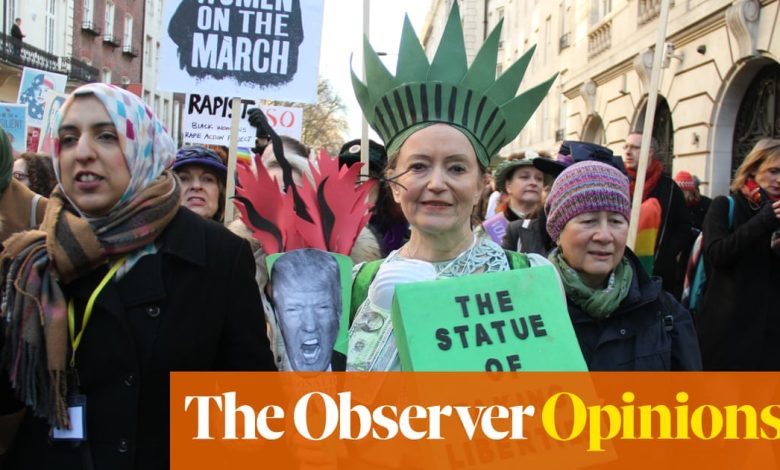There are cracks in the feminist movement, but I have faith in women to stand up to Trump | Natasha Walter

[ad_1]
Uwhat happens in America doesn’t stay in America. The prospect of a second Trump administration is devastating for many American women, but its reverberations are reverberating for women around the world, bringing far more fear and uncertainty than the last time.
Eight years ago, while Trump’s success shocked women in Britain, it also brought a glimmer of hope – in the form of a resurgence of solidarity. The day after the 2016 election. I remember entering my workplace, a charity for refugee womenfeeling rather gloomy and looking at the downcast faces of other women. Then at the end of the day, one of our colleagues received the most unexpected news. The charity’s online donations have soared.
Looking at the list of donations, many accompanied by messages of support, my heart soared. I realized that so many women, waking up to this bitter news, had chosen not despair but determined support for those Trump hated most—women and migrants—and backed that empathy with action.
A few months later, this surge of solidarity took on its most colorful and energizing form. The Women’s Marches didn’t just take place in Washington and US cities, they took place on every continent. Even women in Antarctica organized a rally on an expedition ship. I saw them as part of a rising wave of women’s protests. Through the Green Wave in Latin America and other protests against violence and for reproductive rights everywhere from Poland to South Korea, India to Ireland, so many women’s movements became increasingly visible. The Women’s Marches were sort of the icing on the cake, so bright, so wonderful – but also fragile and soon to show cracks.
There are planned protests in Washington for Trump’s second inauguration, but they are likely to be more subdued and unlikely to be accompanied by pink-hatted crowds marching through cities around the world. why
Some of the cracks that make solidarity so elusive this time began to show even then. The famous image of activist Angela Peoples holding a “White Women Voted Trump” sign at the 2017 March on Washington is being shared again. And her opinion is more urgent now. And yet again, a majority of white women chose to put a sex offender in the White House and undermine the reproductive rights of other women.
As one black woman so aptly said on social media in response to the proposal for another women’s march: “White women should have gone to the polls to vote against Trump.”
And other fissures that began to open then have also gaped ever wider ever since. In the UK in 2017 controversy quickly erupted over whether the Women’s March was as well too exclusively for trans women – because those pink hats might be “exclusive to trans women” – or, conversely, too eager to center them. Since then, winning arguments about gender identity seems to be more important to some feminists than finding common ground.
While the backlash gathered pace, not only in the US, international feminist solidarity weakened on other fronts as well. In the past, there was little hope in many international organizations that liberal feminism could be promoted anywhere with the support of US power and money. That vision grew increasingly fragile, but it really fell apart when the US pulled out of Afghanistan in the summer of 2021. and Afghan women, once blithely promised support and protection, were forced back into their homes and brutally punished for speaking out.
And it has become even more difficult to adhere to the rhetoric of global women’s solidarity after Western women have become helpless witnesses to the conflict in Gaza. While US Made Bombs falls on women and children, it is hard to imagine marching for the freedoms of American women.
In these dark times, it may sound crazy to say that I am not giving up on women’s solidarity. But for me, as for so many women, solidarity is not an idea, but a practice; it’s not a performance, it’s work – hard work. Lately, I’ve been talking to women all over the world—from Northern Ireland to Canada, from Iran to Peru—and time and again I hear how they’re continuing their feminist work, which may not involve as much marching and singing now, but it’s just as fierce and persistent. as always.
after the promotion of the newsletter
Every day a woman needs an abortion, she needs asylum, she needs a lawyer, she needs food, she needs shelter, and every day women stand up for each other, feed, care, build, heal, plant.
This very material sense of common struggle, based on a shared experience of marginalization and disempowerment, has not disappeared. On the contrary, with the rise of the populist right, it is becoming more entrenched where it matters, not so much on platforms and podiums as on the front lines of survival.
And so, as I listen to these women, as their stories flow to and through me, I realize that there at the roots a deep solidarity continues to grow in the darkness, and I have faith that one day I will see it blossom again.
Natasha Walter is the author of Before the Light Goes Out: A Family Story of Resistance and founder of Women for Refugee Women
-
Do you have an opinion on the issues raised in this article? If you would like to submit a letter of up to 250 words to be considered for publication, email it to us at observer.letters@observer.co.uk
[ad_2]




